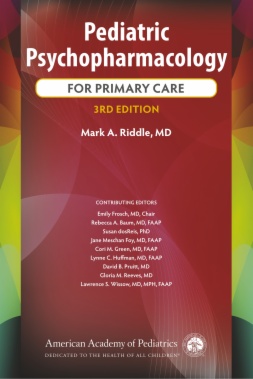Completely updated and revised, the third edition provides primary care physicians with practice-tested, condition-specific treatment recommendations for various childhood mental disorders. Obtain clear guidance on dosing, monitoring, and potential adverse reactions of psychotropic medications for treatment of common psychiatric disorders and mental health or behavioral problems in children and adolescents.
It includes digital tools offering instant access to additional information on psychotropic medications.
TOPICS INCLUDE- Conceptual framework for prescribing psychotropics
- Newly approved medications, changes in regulations and guidelines, and updates in the professional literature are included in this new edition
- Medications for specific diagnoses—ADHD, anxiety, and depression
- Food and Drug Administration approved antipsychotics and mood stabilizers and all other medications
- What to do when treatment is unsuccessful
- Introduction
- Target Audience
- Why Now?
- What Does This Book Contribute?
- References
- Part 1: Before Prescribing
- Chapter 1: Getting Started
- Guiding Psychopharmacology Principles
- Additional Guiding Principles
- Organization and Overview
- Selected Changes and Updates in Third Edition
- Chapter 2: Conceptual Framework for Prescribing Psychotropic Medications
- Rationale for the Conceptual Framework
- Group 1 Medications for Attention-Deficit/Hyperactivity Disorder, Anxiety, and Depression
- Group 2 Medications
- Group 3 Medications
- References
- Chapter 3: Making a Diagnosis
- Overview
- Diagnosis of Common Disorders: ADHD, Anxiety Disorders, and Depression
- Diagnosis of Common Comorbidities of ADHD, Anxiety Disorders, and Depression
- Recognizing Other Psychiatric Disorders
- Determine if Medication Is Indicated
- Recognize Need for Referral
- References
- Chapter 4: Laying the Groundwork
- Formulation
- Feedback
- Nonmedication Interventions
- Informed Consent
- Specific Consent Issues
- Off-label Prescribing
- US Food and Drug Administration Boxed Warnings
- Triage for Psychiatric and Social Emergencies
- Important Considerations for Safe and Effective Prescribing
- References
- Part 2: Group 1 Medications for Specific Diagnoses: Attention-Deficit/Hyperactivity Disorder, Anxiety, and Depression
- Chapter 5: Group 1 Medications for Attention-Deficit/Hyperactivity Disorder
- General Guidance
- Methylphenidate
- Amphetamine
- Guanfacine
- Clonidine
- Atomoxetine
- Viloxazine
- Summary
- References
- Chapter 6: Group 1 Medications for Anxiety and Depression
- General Guidance
- Group 1 Selective Serotonin Reuptake Inhibitors
- Group 1 Serotonin and Norepinephrine Reuptake Inhibitor: Duloxetine
- Summary
- References
- Part 3: Group 2 and Group 3 Medications
- Chapter 7: Group 2 Medications: FDA-Approved Antipsychotics and Mood Stabilizers
- Rationale
- Antipsychotics
- The Mood Stabilizer Lithium
- Summary
- References
- Chapter 8: Group 3 Medications: Others Commonly Prescribed
- Other Antidepressants
- Other Antipsychotics
- Other Mood Stabilizers
- Anxiolytics
- Sleep Aids
- Future Considerations
- References
- Part 4: After Prescribing: Midcourse Corrections
- Chapter 9: Fine Tuning Treatment
- Reevaluate Therapies
- Reevaluate Medication
- Discontinuing Group 1 Medications
- Switching Group 1 Medications
- When to Consider Group 2 Antipsychotics or Lithium
- When to Consider Group 3 Medications Without FDA Approval for Use in Youth
- When to Consider Drug Levels or Genetic Testing
- Can Genotyping Improve Medication Response?
- When to Consider Consultation or a Second Opinion
- References
- Chapter 10: Managing Treatment Impasses
- Reassess Diagnoses
- Complex Psychosocial Presentations
- Expert Consultation or Referral
- Reference
- Appendixes
- A. Assessment and Symptom Monitoring Tools
- B. Resources for Clinicians
- C. Training Resources for Clinicians
- D. Quality Ratings for Psychotherapies and Efficacy Data for Medications
- E. Resources for Caregivers
- F. Diagnostic and Statistical Manual of Mental Disorders, Fifth Edition, Complete Criteria of Select Diagnoses
- Index

